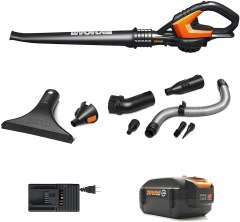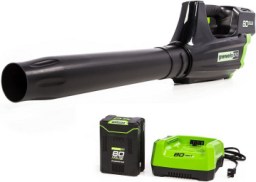Buying guide for best cordless leaf blowers
The days of spending hours raking the yard aren't completely over, but they should be. Raking is best suited for the detail work around delicate flowers. For the rest of the yard, there are several reasons to use a powerful leaf blower.
The primary reason is speed. A leaf blower can get the job done in a fraction of the time you would take using an old-fashioned rake. You could spend all afternoon raking your yard, or you could finish your yard work in a fraction of the time with a leaf blower, leaving more time for the things you enjoy.
Cordless leaf blowers give you the mobility to maneuver around your yard, trees, fence line, house, sidewalks, and driveways without getting tangled in a long extension cord. To complement their convenience and ease of use, cordless leaf blowers also provide multiple speed settings and nozzle tips that increase control and help you get the job done faster.
Key considerations
Power source
Gas: When people hear or read the term cordless leaf blower, they automatically think of electric, battery-powered tools. Technically, gas-powered blowers are also cordless — they have just as much mobility and utility as battery-operated ones. The two main differences are the noise and the gasoline fumes.
One and two-stroke engines are loud — there’s no way around it. That’s not a problem if you’re blowing leaves in the middle of the day, but what if you want to get out there at the crack of dawn to get the leaves taken care of? Your neighbors may have some things to say.
Gas engines obviously require gasoline, along with all the fumes and spills that inevitably accompany them. The initial price of gas-powered blowers is less than the price of battery-powered ones, but you’ll never be free of the ongoing expense of buying gas for them.
Battery: Technology in battery-powered leaf blowers has advanced to the point that they’re competitive with gas-powered ones in terms of airspeed and how many cubic feet of air they can move per minute. Longer-lasting lithium-ion batteries can carry you through your entire yard on a single charge and still deliver full power right to the end.
There is noise from the blower fan, but when you subtract the noise of a gas engine, battery-powered blowers are the winners, hands down. Finally, the batteries can be recharged over and over again. It doesn’t take long before it has paid for itself in terms of saving on gas.
Size
The length of the blower is the main consideration when it comes to size. A longer air tube can reach the ground without requiring you to bend or stoop over, though it is also more awkward to move around.
Weight
Until recently, battery-powered leaf blowers always weighed more than gas-powered ones. That’s still true on some models, which can weigh up to 17 pounds Others weigh 10 pounds and under, putting them in the same weight bracket as gas-powered blowers.
Wind speed
The faster the air moves out of the nozzle, the more it blows the leaves around. Airspeeds between 90mph and 120mph are normal for today’s battery-powered devices.
Cubic feet of air
The number of cubic feet of air is a measure of the volume of air moving through the tube. More volume equals more force moving the leaves. More speed and more cubic feet of air equals more power. More power means you get the job done faster.
When we analyze gas-powered leaf blowers, we take note of the build and noise level. Is it awkward to maneuver? Is it extremely loud? Our research terms reflect our readers’ interests and concerns.
Our research of cordless leaf blowers includes those powered by gas and those powered by electricity. We inform ourselves, and our readers, about the pros and cons of each type.
The length of the leaf blower air tube varies from model to model. There are pros and cons to long and short tubes, which we factor into our assessments.
Some cordless leaf blowers run on rechargeable lithium-ion batteries. When we consider battery-powered models, we want to know how long the blower will run when the battery is fully charged.
We advise consumers what to expect when it comes to the weight of a leaf blower. This is an important consideration for those with limited strength who prefer lightweight tools.
The air movement and wind speed delivered by a leaf blower impact how well the tool performs. We take these factors into account when researching gas and electric models.
We check for a trigger lock when looking at a leaf blower. This feature appeals to consumers with large tasks to accomplish, as it locks in speed settings for efficient work.
Variable speed settings allow users to choose the power of air movement emitted from a leaf blower. We look for this feature in our product research.
Customers want to know how challenging a leaf blower is to start. We take this into consideration, noting that gas-powered blowers can be quirky when it’s cold outside.
During the research process, we scrutinize the build of each cordless leaf blower on our research list. We consider whether each model is bulky or compact, which is important to know when it comes to using and storing the tool.
Features
Variable speed settings
Sometimes, you might want less air power around delicate plants or in tight corners. Variable speed settings can be a blessing when you’re blowing dirt and leaves off your porch and you don’t want them billowing back in your face. If you’re going to be using your blower in tight spaces, make sure it has variable speed controls.
Trigger lock
A trigger lock allows you to lock the trigger in place so you can relax your hand … or switch the blower from hand to hand without interrupting its functioning. This becomes critically important for bigger jobs, since your hands can cramp without it.
Run time
How long a blower runs on a single battery charge is considered the run time. The longer the run time, the less often you have to change batteries. As technology continues to advance, expect to see run times lengthen. In the meantime, look for the best one you can.
Accessories
Leaf collection attachment: Once your leaves are collected in one spot, you still have to bag them. A leaf collection attachment is very helpful here. You can make your life easier with a leaf collection system that attaches to all the major brand-name blowers.
Quick battery charger: A quick battery charger is particularly useful if you've got a big yard or several cordless devices. They normally come with their own charger so you are able to keep them charged and ready to go.
- Cordless blower accessory kit: A cordless blower accessory kit is a universal kit with attachments for cleaning out the gutters on your house, along with different nozzles to vary the focus at the tip of the air tube.
Cordless leaf blower prices
Inexpensive: Anything under $100 is the low price range. For that, you get the bare tool without a battery or charger. If you had a blower that died on you but the charger and battery are still good — and all you need is the blower itself — this is the way to go.
Mid-range: The majority of leaf blowers sit in the $100 to $200 range. They come with a battery and charger, and in some cases, two batteries. You can find trigger locks, variable speed controls, and better airspeed here as well.
Expensive: Over $200 is where you find top-end professional blowers with higher airspeed over 150mph, more cubic feet of air being pushed, and better quality construction. Some include three or four batteries with the blower.
Tips
Start at the house and work your way away from it, blowing the leaves ahead of you.
Don’t put the nozzle too close to the base of a pile of leaves — you’ll just scatter them.
Move the nozzle back and forth in a slow, steady motion when you’re blowing leaves.
The taller the grass, the more airspeed you will need to get the leaves out of it.
Use a wide nozzle when you’re moving the leaves together in a pile. It drops the air pressure and keeps the leaves from being scattered.
Blow the leaves in the same direction as the prevailing wind. Otherwise, they may blow back in your face.
FAQ
Q. How many batteries should I keep on hand?
A. Two. Keep one in the blower and one in the charger. This prevents you from having to wait while a lone battery recharges.
Q. Should I get a two-battery leaf blower?
A. These machines last longer and deliver more power. However, they do so at the cost of nearly doubling the weight of the blower. The choice is yours.
Q. Does the battery charger require a three-pronged outlet?
A. This is the most common question of all, and the answer is yes.





















































